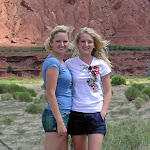The Future of News is daunting. We know the internet has drastically altered the playing field. But there is an upside: most news outlets are creating web departments, opening jobs for web specialists and designers, and acknowledging the presence of alternate emerging media. For my Journalist Interview I had a conference with the web department at the NBC affiliate in Boise. I worked with the station a little this summer, and never got a chance to talk to them specifically about web-based journalism, so i dug a little deeper.
It was fun for me to realize how optimistic and excited they are for the future of journalism. The internet is not something that needs to be feared or compensated for, it is something new and full of opportunity that needs to be embraced and adjusted for. Here is a transcript of our conversation...I'm giving the most interesting answer for each(in my opinion! what are blogs for?)
Q:Why did you decide to become a web-based journalist?
A: I recognized digital media as a very moldable versatile medium. I recognized it as a chance to explore new opportunities and break-through technology. It fascinated me, and I was really good with computers! The job market for internet positions at stations was so much more forgiving and open than reporting jobs, so I gave it a try and it ended up working for me more than I thought it would.
Q:How do you define good journalism? What should be posted to the websites or covered in online packages?
A: I ask myself, what does your audience want to know? What will they be searching for this morning once they drop their kids off at the bus stop? The internet is more important than most think. People are turning more and more to it because they can have a more refined search on their personal timetable. I define good journalism as journalism that explains he world to the audience, explains what is going on, but doesn't tell them what to think. It doesn't tell them what to believe or what to do, but it is a medium for information. When you inform, you are doing your job, but deciding what to inform about it the hard part.
Q:Do you feel NBC practices good journalism based on your definition of it?
A:I do. We stick to our station motto, but that in no way dampens our journalistic content. I feel that NBC is one of the top stations in breaking news coverage, and our reporters are dedicated to finding stories applicable to the people.
Q:Does your organization allow you to do the type of journalism you want to do?
A: Of course they masage ideas from everyone at the station, but I wouldn't say they cover the news I specifically want. If I could get news it would be on new movies and video games, so of course they don't cover that! It's important to target your information to the general audience in your area, it's tricky when you get really specific to a demographic. But, they take my ideas for what they are worth, and they realize the importance of digital media.
Q:What is your opinion about civic journalism or citizen journalism?
A: oh, we need it. It is so important to what we do at the station. Most stories come from tips, from people calling or e-mailing and telling us what's gong on, what they want to hear about. Without the citizens digging up things, we wouldn't know half of what we do about the underground happenings in the community.
Q:Have you ever had an experience where you felt that your journalism really made a difference?
A: I couldn't really pick out a specific story or instance, but I can tell you that wehn we get e-mails thanking us for the things we do, it is such a good feeling. We get e-mails thanking us for the channel's work in changing the community, and of course the people love the BSU football coverage, it's silly, but it's what they want to hear!
Q: Have you been affected by dropping circulations, ratings, layoffs, and
growth of citizen journalism?
A: I think it can be said the same for stations across the country. Less and Less jobs are available, and the people who are kept on need to be very versatile workers. The reporters write their own web stories, and sometimes edit on their own. More people are taking on more responsibility as less people are part of the newsroom. Producers are amazing, they do as much work as five of us. But my job is fairly stable because the internet is emerging, new, and needed.
Q:What advice would you give to students, like me, who want to go into journalism?
A: I would tell them to grow a tough skin. As sad as this may be, news is cut throat, it's first come first serve. There is a time for sensitivity, when interacting with interviewees, there is a time for respect and propriety when dealing with directors and editors, but there is a time to get to the bottom of things, and reporters learn to balance their emotions and behavior like that. They are very accomplished investigative intelligent people, I admire their work and persistence every day.
AND SO IT GOES..... THERE YOU HAVE IT! WHAT A FUN INTERVIEW!


No comments:
Post a Comment